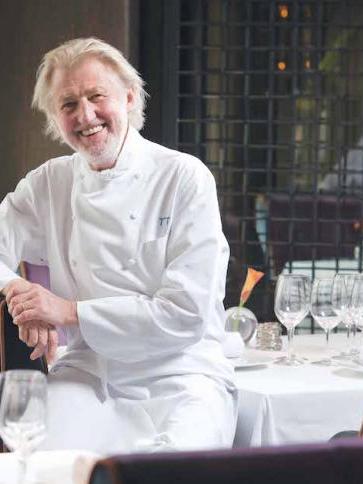In the summer of 2015, James Murphy—front man of LCD Soundsystem—jumped head-first into the f&b industry when he opened up his 38-seat natural wine bar, The Four Horsemen, in the heart of Williamsburg at 295 Grand Street. Just like his Brooklyn-based band, this sleek restaurant—where locals could listen to his favorite albums via vintage preamplifier—became a local treasure.
Helming the kitchen is Nick Curtola. The San Francisco native cut his teeth at Camino in Oakland, did a stint in Italy, and came to New York to work Franny’s, Glady's and Roman’s before becoming opening executive chef of The Four Horsemen, where he still steers ship.
At Four Horsemen, sample dinner items include marinated Maine mussels with onion vinaigrette and opal basil; spicy Spanish mackerel with Maine uni, koshihikari rice and toasted nori; butter bean purée with grilled flatbread, mint, radish and Sicilian olive oil; and roasted scorpion fish with tatsoi, porcini mushrooms and fish head dashi. Diners, take note from our anonymous inspectors: “weekend lunches include a set menu of four small dishes, and at $32, they're a relative bargain.” (Duly noted.)
When Curtola isn’t in the kitchen, he opts for Korean and Japanese fare. “I also love restaurants like Pastis, Estela and Via Carota,” he adds. “Consistent neighborhood spots that aren’t just the latest and greatest flash in the pan.”
And as for the future of New York City’s culinary scene? “My hope is for a return to simpler cooking with a focus more on sourcing beautiful ingredients as opposed to current trends with regards to technique,” Curtola adds.
Here, we ask The Four Horsemen’s chef about his relationship with the MICHELIN Guide and what it was like when he received the famous phone call.
What was your first encounter with the MICHELIN Guide?
My first encounter with the Guide was back in San Francisco. I had the chance to dine at The French Laundry, which was also my first three-star experience. The Guide was an amazing reference point for hungry cooks who wanted to work at the best restaurants in the world. It definitely dictated many choices I made along my journey.
What were your thoughts when you knew you received a star?
My first thought upon receiving the star was sheer joy for my staff. I was so proud of my team and I was also so excited that our hard work had finally been noticed. They deserved it as much as I did.
How did you celebrate?
My general manager and I went to the formal MICHELIN celebration in Manhattan. We then went back to the restaurant and opened numerous bottles of Champagne, [and] celebrated with our regulars as well as former and current staff. It was definitely the highlight of my career to share the joy of such an accomplishment with those who have helped along the way.
How much influence/inspiration does the MICHELIN Guide have on your career?
The Guide has always been an influence on my industry. Whether you’re chasing a star or not, you’re aware of its presence and its effect on the culinary world. Restaurants that have any number of stars are widely regarded as establishments going above and beyond the status quo. Restaurants who are pushing the envelope and whose influence can be seen via the trickle-down effect are generally recognized by the Guide.
Does having a star change the direction of your restaurant?
I feel like we earned a star doing what we do, so I’m not inclined to make any drastic changes. If anything, it just makes me not lose sight of attention to details, consistency and creativity. I want to continue to be a destination restaurant and a place that’s worthy of a special trip.
What advice do you have for young chefs aiming for MICHELIN stars?
Instead of focusing on getting a star or stars, focus on your craft. Focus on your voice and your vision. Focus on your guests and most importantly, focus on cooking delicious food every single day. Stick to your vision, hone your craft and try to be better each day. Over time, that will not go unnoticed.
Hero image courtesy of The Four Horsemen.

















